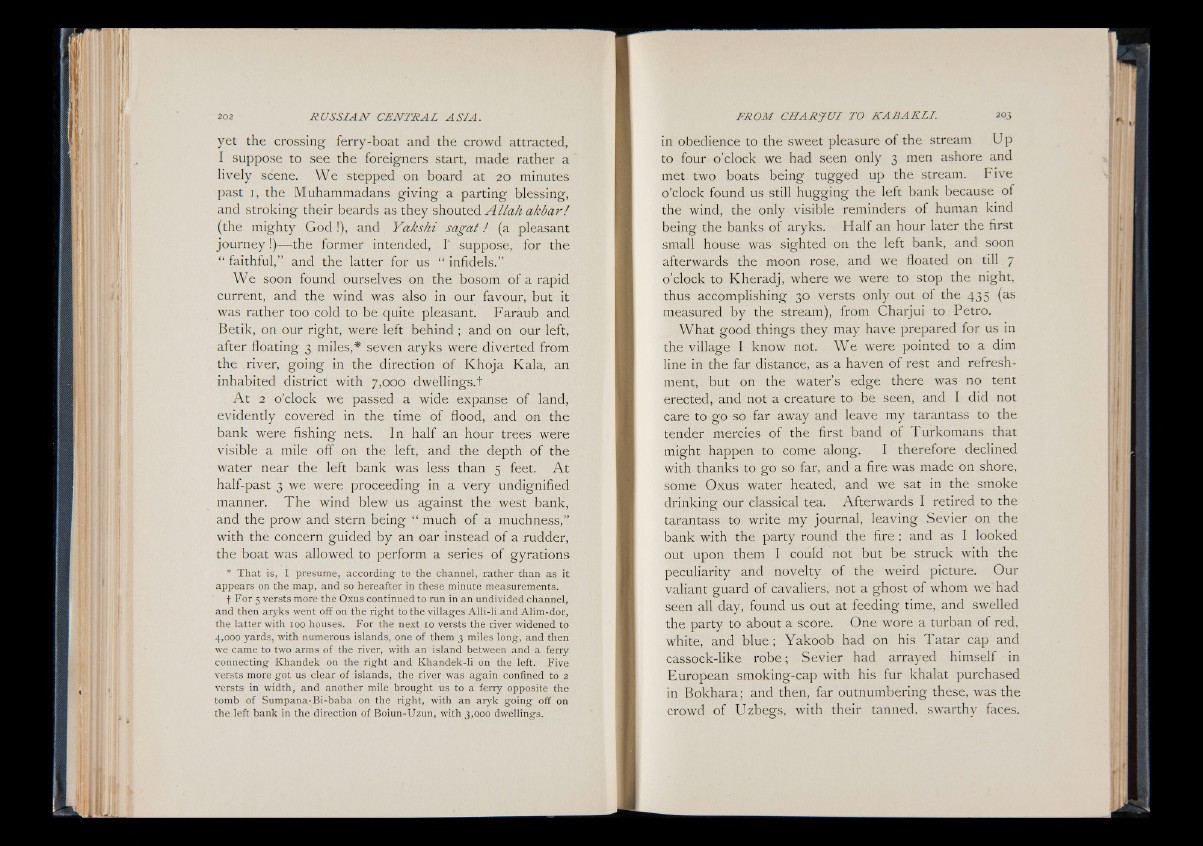
yet the crossing ferry-boat and the crowd attracted,
I suppose to see the foreigners start, made rather a
lively scene. We stepped on board at 20 minutes
past 1, the Muhammadans giving a parting blessing,
and stroking their beards as they shouted A lla h akbar!
(the mighty God !), and Yakshi sagat! (a pleasant
jou rn e y!)— the former intended, I suppose, for the
“ faithful,” and the latter for us “ infidels.”
We soon found ourselves on the bosom of a rapid
current, and the wind was also in our favour, but it
was rather too cold to be quite pleasant. Faraub and
Betik, on our right, were left behind ; and on our left,
after floating 3 miles,* seven aryks were diverted from
the river, going in the direction of Khoja Kala, an
inhabited district with 7,000 dwellings.!
A t 2 o’clock we passed a wide expanse of land,
evidently covered in the time of flood, and on the
bank were fishing nets. In half an hour trees were
visible a mile off on the left, and the depth of the
water near the left bank was less than 5 feet. A t
half-past 3 we were proceeding in a very undignified
manner. The wind blew us against the west bank,
and the prow and stern being “ much of a muchness,”
with the concern guided by an oar instead of a rudder,
the boat was allowed to perform a series of gyrations
* That is, I presume, according to the channel, rather than as it
appears on the map, and so hereafter in these minute measurements.
f For 5 versts more the Oxus continued to run in an undivided channel,
and then aryks went off on the right to the villages Alli-li and Alim-dor,
the latter with 100 houses. For the next 10 versts the river widened to
4,000 yards, with numerous islands, one of them 3 miles long, and then
we came to two arms of the river, with an island between and a ferry
connecting Khandek on the right and Khandek-li on the left. Five
versts more got us clear of islands, the river was again confined to 2
versts in width, and another mile brought us to a ferry opposite the
tomb of Sumpana-Bi-baba on the right, with an aryk going off on
the left bank in the direction of Boiun-Uzun, with 3,000 dwellings.
in obedience to the sweet pleasure of the stream Up
to four o’clock we had seen only 3 men ashore and
met two boats being tugged up the stream. Five
o’clock found us still hugging the left bank because of
the wind, the only visible reminders of human kind
being the banks of aryks. Half an hour later the first
small house was sighted on the left bank, and soon
afterwards the moon rose, and we floated on till 7
o’clock to Kheradj, where we were to stop the night,
thus accomplishing 30 versts only out of the 435 (as
measured by the stream), from Charjui to Petro.
What good things they may have prepared for us in
the village I know not. W e were pointed to a dim
line in the far distance, as a haven of rest and refreshment,
but on the water’s edge there was no tent
erected, and not a creature to be seen, and I did not
care to go so far away and leave my tarantass to the
tender mercies of the first band of Turkomans that
might happen to come along. I therefore declined
with thanks to go so far, and a fire was made on shore,
some Oxus water heated, and we sat in the smoke
drinking our classical tea. Afterwards I retired to the
tarantass to write my journal, leaving Sevier on the
bank with the party round the fire ; and as I looked
out upon them I could not but be struck with the
peculiarity and novelty of the weird picture. Our
valiant guard of cavaliers, not a ghost of whom we had
seen all day, found us out at feeding time, and swelled
the party to about a score. One wore a turban of red,
white, and blue; Yakoob had on his Tatar cap and
cassock-like ro b e ; Sevier had arrayed himself in
European smoking-cap with his fur khalat purchased
in Bokhara; and then, far outnumbering these, was the
crowd of Uzbegs, with their tanned, swarthy faces.